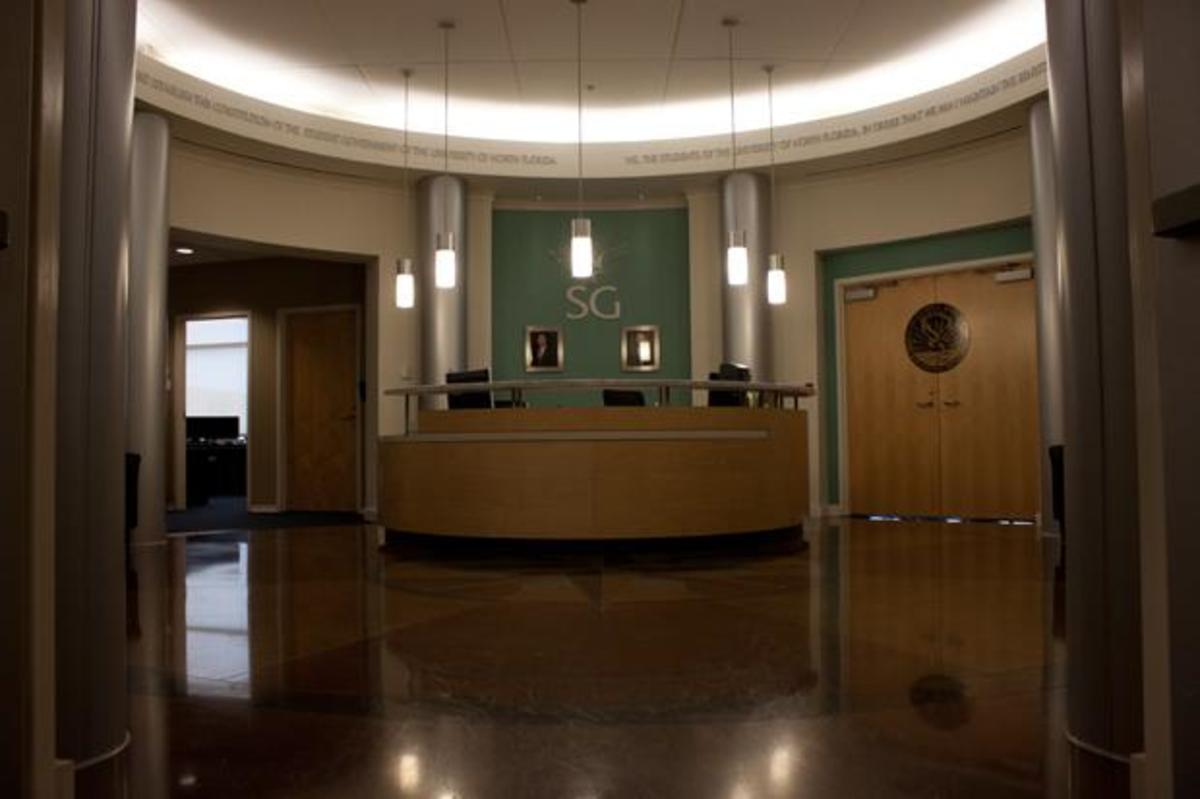
Photo by Joshua Brangenberg
Last week’s Student Government (SG) elections featured online voting for the first time. With a voter turnout of 838, this is the first time fewer than 2,500 students voted in a contested election since 2008.
UNF’s student body is made up of 16,158 students, according to SG’s unofficial election results.
This was the first contested Senate election since Fall 2012. Of the 27 candidates, all 17 Red Party members who ran won a seat in the Senate, with independent candidates winning the remaining three positions.
The last contested election of Fall 2012 had a voter turnout of 3,279 students.

Elections Commissioner True Rains was appointed over summer term to increase student participation in student elections, as well as raise awareness of them and SG itself.
“If you look at the numbers, we did have less voters,” Rains said. “I knew coming into it that that was going to happen… It’s not a change we can make immediately.”
In his first election, Rains changed how SG campaigned and promoted elections.

“I made a decision from the beginning that I didn’t want to give out like free pizza, or donuts, or whatever they used to do in the past because I felt like that just led to voters clicking on stuff just to get the free pizza,” Rains said. “They didn’t care who they were voting for. So I decided that I wanted to have 850 informed voters rather than 2,000 voters who clicked because they wanted a free slice of pizza.”
Students like Patricia Carballal, marketing senior, and Alex Brown, nutrition and dietetics junior, did not even know there was an election.
Nick Norris, anthropology junior, said he did not vote either and SG didn’t do enough to promote the elections.

“I have no clue what they’re running for,” Norris said. “Why would I care about voting?”
Matt Mills, business management junior, said SG did a good job spreading the word about the elections but could have done more.
According to SG 2014-15 budget, SG elections are allocated $5,000 for operating expenses.
Students had the opportunity to learn about each candidate through a Facebook photo album with a photo and short description of each candidate. Students could view the album if they “liked” the SG Facebook page.

The album, created by Rains, was also made available for students to reference as they voted. Rains said the album was created and published within two weeks of the election.
In a previous interview with the Spinnaker, Rains said Joseph Turner’s email could include a link to the album. The email Turner sent out did not include such a link.
Rains said they were going to have a link to the Facebook album on the online ballot. The online ballot did not have a link to the Facebook album.
SG elections in March were not contested due to a lack of candidates. In order to have more students apply for candidacy, Rains said he changed the requirements to make it easier for students to apply.
Applicants for candidacy must have a candidate declaration of intent, sign a FERPA release and a code of ethics, and submit a financial report after the election.
Rains said the previous prerequisites to run for SG made people unable to follow through with their decision.
“Last year, there were some attendance requirements,” Rains said. “You had to attend three committee meetings, a senate meeting, a candidate seminar, you had to get 150 signatures… we definitely made it a lot easier to run this fall.”
After the elections, Rains filed judicial complaints against six senate candidates concerning late or missing financial statements. The statements catalogued what each candidate spent on their campaigns, but five of the complaints were dismissed by Attorney General Matthew Harris.
Sasha Douglas’ financial statement was found and Harris dismissed her case. Financial statements for candidates Perla Gracia and Thomas Beaucham were found as well, but they were not elected so their cases were dropped as well. The financial statements for candidates Rachel Chesnes and Austin Daniels were not found. However, they were not elected, resulting in their cases also being dismissed.
Each of the candidates Rains filed complaints against were running as independents. While each independent candidate must submit their financial statements individually, candidates representing a political party, like the Red party, rely on only one financial statement submitted by the party.
Farrah Azzouz was the only candidate whose judicial complaint was deemed to have merit. Azzouz’s hearing was held Nov. 5 and Spinnaker is waiting on comment from Chief Justice Daniel Powers on the decision of Azzouz’s trial.
Email Christian Ayers at reporter14@unfspinnaker.com











